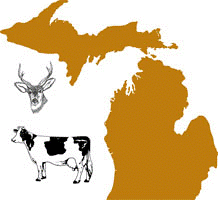Wildlife Disease and Zoonotics

Michigan Bovine Tuberculosis Bibliography and Database
Date of this Version
3-2000
Abstract
Tuberculosis (Tb) caused by Mycobacterium bovis is a worldwide threat to livestock and humans. One control strategy is to breed livestock that are more resistant to Mycobacterium bovis. In a 3-year heritability study 6 farmed red deer stags were selected from 39 on the basis of their differing responses to experimental challenge via the tonsillar sac with approximately 500 CFU of M. bovis. Two stags remained uninfected, two were moderately affected, and two developed serious spreading Tb. Seventy offspring, bred from these six stags by artificial insemination using stored semen, were similarly challenged with M. bovis. The offspring showed patterns of response to M. bovis challenge similar to those of their sires, providing evidence for a strong genetic basis to resistance to Tb, with an estimated heritability of 0.48 (standard error, 0.096; P < 0.01). This is the first time the heritability of Tb resistance in domestic livestock has been measured. The breeding of selection lines of resistant and susceptible deer will provide an ideal model to study the mechanisms of Tb resistance in a ruminant and could provide an additional strategy for reducing the number and severity of outbreaks of Tb in farmed deer herds. Laboratory studies to identify genetic and immunological markers for resistance to Tb are under way. Preliminary studies showed no associations between NRAMP or DRB genes and resistance to Tb in deer. Patterns of immune responses seen in resistant animals suggest that both innate and acquired pathways of immunity are necessary to produce the resistant phenotype.


Comments
Infection and Immunity (March 2000): 1,620–1,625